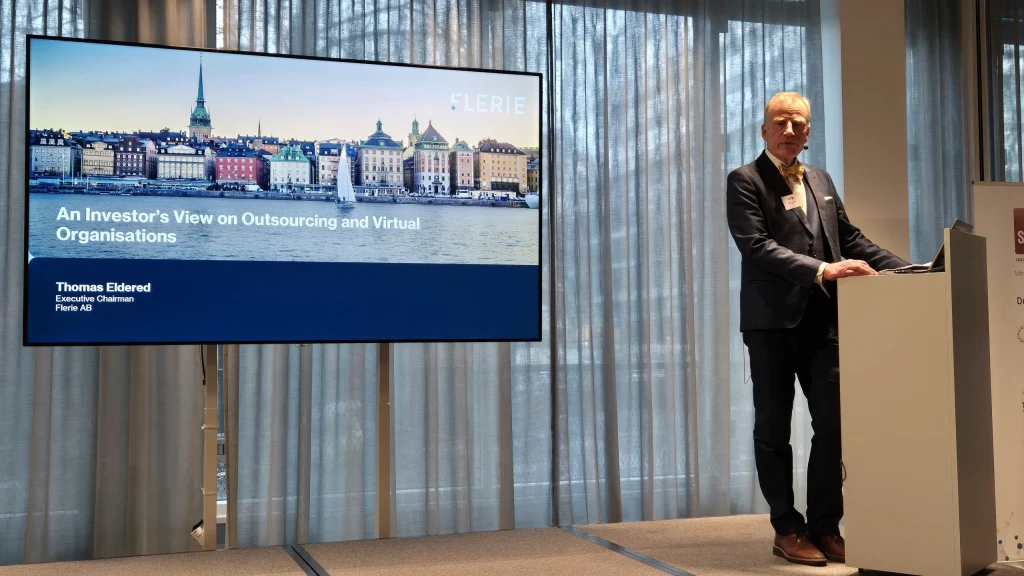Article
Based on a presentation given by Thomas Eldered at the PharmaOutsourcing event, Stockholm, Sweden, December 2024.
From vertical integration to decentralization
The pharmaceutical industry has undergone a seismic shift over the last several decades, transitioning from a vertically integrated model to a decentralized ecosystem of partnerships and specialized services. This transformation has ushered in what many now recognize as the CDMO era – an age defined by outsourcing, collaboration, and rapid innovation. For investors, this evolution presents a unique opportunity to engage with a sector that is both resilient and dynamic.
Historically, pharmaceutical companies operated under a fully integrated model, where they controlled every aspect of drug discovery, development, and manufacturing. This model dominated for much of the 20th century, providing developers with full control over their intellectual property, supply chains, and manufacturing processes. However, as the complexity of drug development grew, the limitations of this approach became apparent. The cost of maintaining in-house expertise for increasingly specialized tasks, coupled with the inefficiencies inherent in such a broad operational scope, began to erode the model’s viability.
The late 1990s and early 2000s marked a pivotal turning point. Advances in biotechnology during this period brought about the “biotech revolution”, shifting the industry’s focus toward complex biologics, including monoclonal antibodies, cell therapies, and gene therapies. These modalities required specialized knowledge and infrastructure that many pharmaceutical companies lacked. Simultaneously, the competitive pressure to reduce time-to-market and development costs became more pronounced. These factors paved the way for the rise of Contract Development and Manufacturing Organizations (CDMOs).
The 2000s saw the rapid proliferation of CDMOs, with companies like Covance, Charles River, and Recipharm emerging as major players in the field. These organizations offered a compelling value proposition: they provided access to specialized expertise and state-of-the-art facilities, enabling pharmaceutical firms to focus on core competencies like research and commercialization. By outsourcing development and manufacturing tasks, companies could reduce their risk in operating manufacturing facilities running half empty, and thereby reduce their capital expenditures, manage risks more effectively, and accelerate product development timelines.
A new era in pharmaceutical development
This shift toward outsourcing marked the beginning of a new era in pharmaceutical development. The model of the “virtual organization” emerged, where biotech startups and even mid-sized firms operated with minimal in-house teams, relying instead on an extensive network of external partners. This approach proved particularly well-suited for early-stage companies, which often faced resource constraints but needed to navigate complex regulatory and technical challenges.
By 2010, the CDMO sector had become an integral part of the life sciences ecosystem. The global CDMO market was expanding rapidly, driven by several key factors. First, the demand for biologics and personalized medicine continued to grow, requiring specialized manufacturing capabilities. Second, the industry faced increasing regulatory scrutiny, necessitating advanced analytical and compliance expertise. Third, the globalization of pharmaceutical supply chains highlighted the need for flexible and scalable manufacturing solutions.
Today, the CDMO industry is a cornerstone of pharmaceutical innovation. The market is characterized by a high degree of specialization, with firms offering tailored solutions across various modalities, including small molecules, biologics, and advanced therapies. This specialization is complemented by a trend toward consolidation, as larger CDMOs acquire smaller, niche players to enhance their capabilities and geographic reach.
In the late 1990s, Thomas Eldered experienced a pivotal moment during a board meeting at a mid-sized pharmaceutical company. The team, juggling the dual challenges of R&D and manufacturing, faced mounting pressure to deliver a promising biologic. One executive’s comment, “We’re scientists, not manufacturers,” struck a chord with Thomas, highlighting the industry’s struggle to manage increasingly complex tasks in-house.
This realization mirrored broader challenges across the pharmaceutical sector. Over the following years, Thomas saw how outsourcing to specialized CDMOs became a game-changer. These partnerships allowed biotech companies to focus on innovation while tapping into the advanced infrastructure and expertise of their collaborators.
In the early 2000s, Thomas witnessed the success of this model firsthand when a small biotech client outsourced its manufacturing to a budding CDMO. The move halved development timelines and helped the company navigate regulatory hurdles, showcasing the real potential of these partnerships.
Today, CDMOs are seen as a cornerstone of the pharmaceutical ecosystem. In areas like cell and gene therapy, outsourcing has become essential for staying agile and precise, reflecting the industry’s shift from working in isolation to embracing collaboration.
NorthX Biologics: beyond traditional CDMO services
Within this competitive landscape, NorthX Biologics has emerged as a unique and innovative player. Unlike many of its peers, NorthX Biologics positions itself not just as a traditional CDMO but as an “Beyond CDMO” operating an Innovation Hub offering a range of services designed to support the development and manufacturing of advanced therapies. The company history reflects its deep roots in pharmaceutical manufacturing. Established as the Statens Bakteriologiska Laboratorium (SBL) in 1909, the organization evolved over decades, eventually transitioning into NorthX Biologics in 2021.
NorthX Biologics’ service offering is comprehensive, encompassing microbial and mammalian expression systems, plasmid DNA, recombinant proteins, viral vectors, and cell therapy solutions. These capabilities are underpinned by a robust infrastructure that includes state-of-the-art GMP facilities, advanced analytical laboratories, and flexible cleanrooms. Notably, a proven track record of regulatory compliance, with multiple successful inspections by the Swedish Medical Products Agency.
One of NorthX Biologics distinguishing features is its focus on advanced therapies, such as cell and gene therapies, mRNA technologies, and personalized medicines. For example, the company has played a critical role in several high-profile projects, including the rapid development of clinical trial materials for novel immunotherapies. In one notable case, NorthX supported HOOKIPA Pharma in scaling up the manufacturing process for a viral vector product, enabling the company to meet tight clinical trial timelines. This project, completed within 18 months, exemplifies NorthX’s ability to deliver innovative solutions under challenging conditions.
Another hallmark is its emphasis on collaboration. The company works closely with clients to understand their unique needs, leveraging its expertise to develop tailored solutions. This collaborative ethos is evident in its work with Mendus, a clinical-stage immuno-oncology company. Together, they established a scalable manufacturing process for Mendus’ lead cell-based therapy, overcoming significant technical and logistical challenges.
When compared to industry giants like Lonza and Catalent, NorthX Biologics differentiation lies in its agility and focus on emerging modalities. While larger CDMOs excel at providing broad, end-to-end solutions, the company offers a more specialized and nimble approach. This is particularly valuable for biotech startups and smaller pharmaceutical firms, which often require customized support to navigate the complexities of advanced therapy development.
CDMOS: a de-risked investment opportunity
The investor perspective on the CDMO sector is overwhelmingly positive. CDMOs represent a de-risked investment opportunity, as their business models are inherently diversified. By serving multiple clients across various therapeutic areas, CDMOs can mitigate the risks associated with individual product failures. Additionally, the sector benefits from strong, long-term societal trends, including an aging population, rising healthcare expenditures, and the growing prevalence of chronic diseases.
For investors, companies like NorthX Biologics signal a forward-thinking approach to pharmaceutical development. The combination of advanced capabilities, collaborative ethos, and focus on innovation positions it as a leader in the rapidly evolving CDMO landscape. The company’s emphasis on advanced therapies aligns with the broader industry trend toward personalized medicine, offering significant growth potential in the years ahead.
Continued growth and transformation
Looking to the future, the CDMO industry is poised for continued growth and transformation. One key trend is the increasing integration of digital technologies, such as artificial intelligence and automation, into manufacturing processes. These technologies have the potential to enhance efficiency, reduce costs, and improve product quality. Another trend is the regionalization of manufacturing capabilities, driven by geopolitical considerations and the need to mitigate supply chain risks.
The pharmaceutical industry is also moving toward a more collaborative ecosystem, where partnerships between CDMOs, biotech firms, and academic institutions play a central role in driving innovation. This shift is particularly evident in the advanced therapy space, where the complexity of products necessitates close collaboration between stakeholders.
In conclusion, the rise of the CDMO era represents a profound shift in the pharmaceutical industry. This transformation has been driven by the need for specialization, efficiency, and collaboration, creating new opportunities for innovation and growth. Companies like NorthX Biologics exemplify the potential of this new paradigm, offering tailored solutions that enable clients to navigate the complexities of advanced therapy development. For investors, the CDMO sector offers a compelling opportunity to engage with a dynamic and resilient industry that is shaping the future of healthcare. As the pharmaceutical landscape continues to evolve, the role of CDMOs will only grow in importance, making this an exciting time for both industry stakeholders and investors alike.

